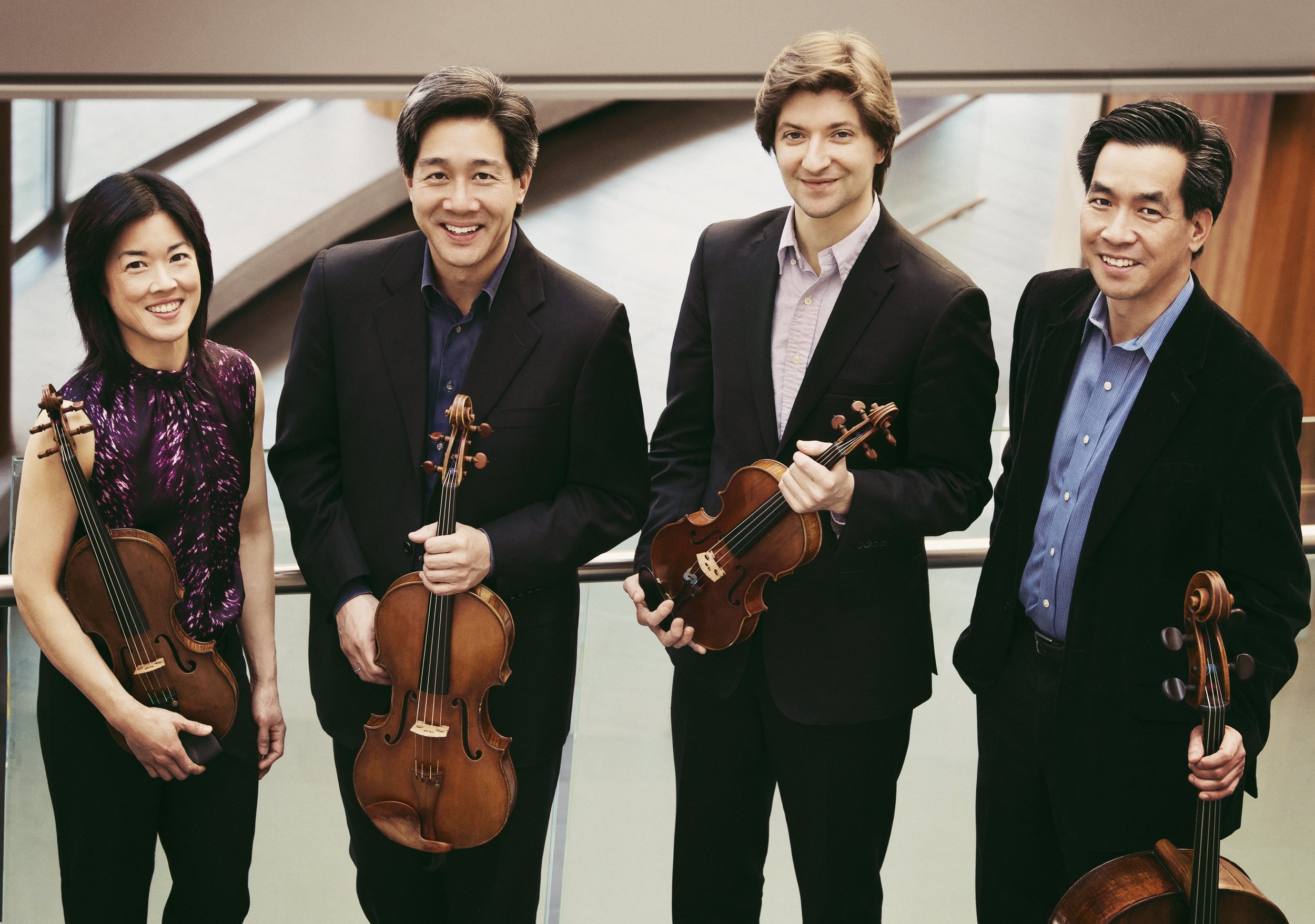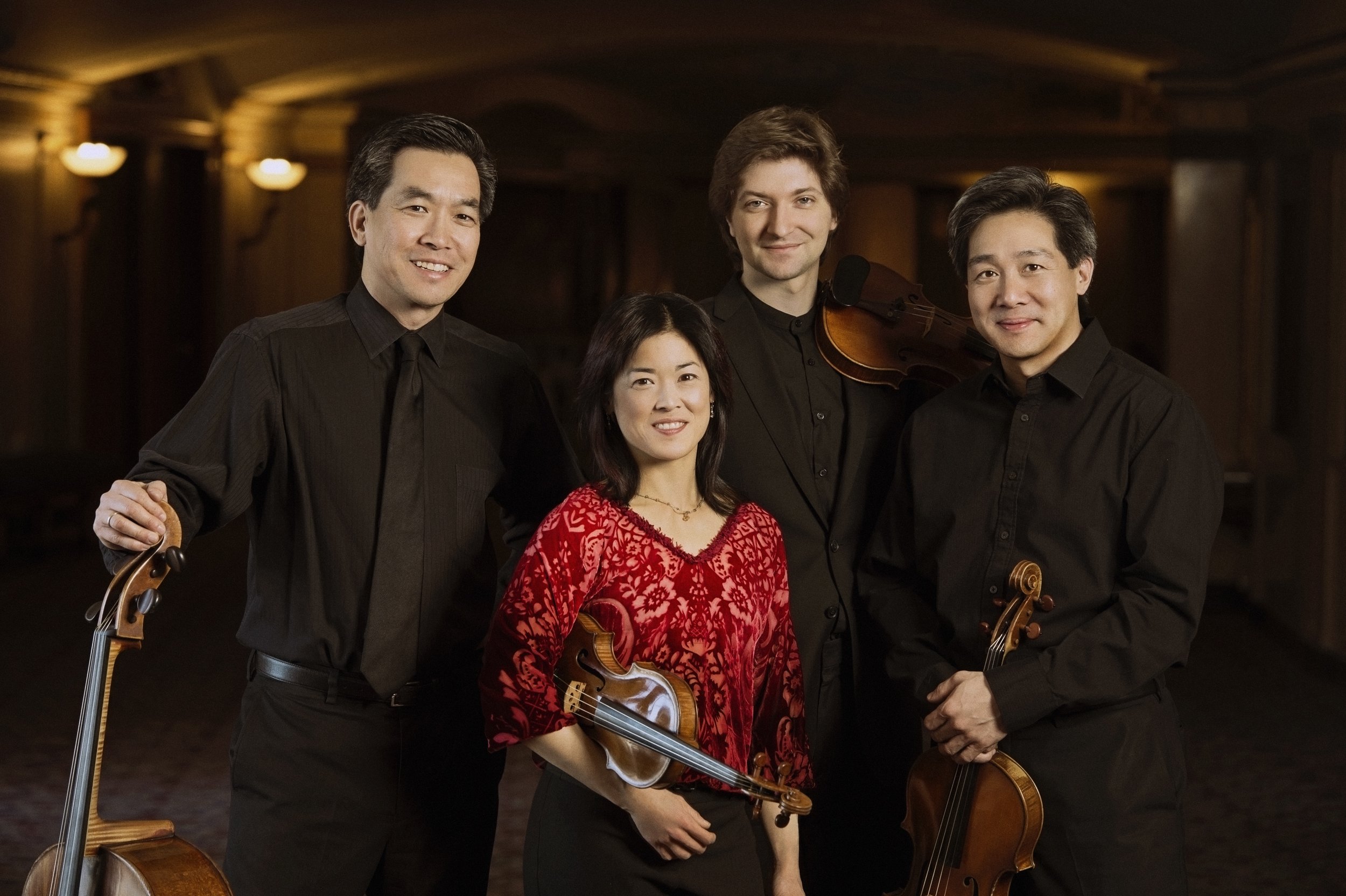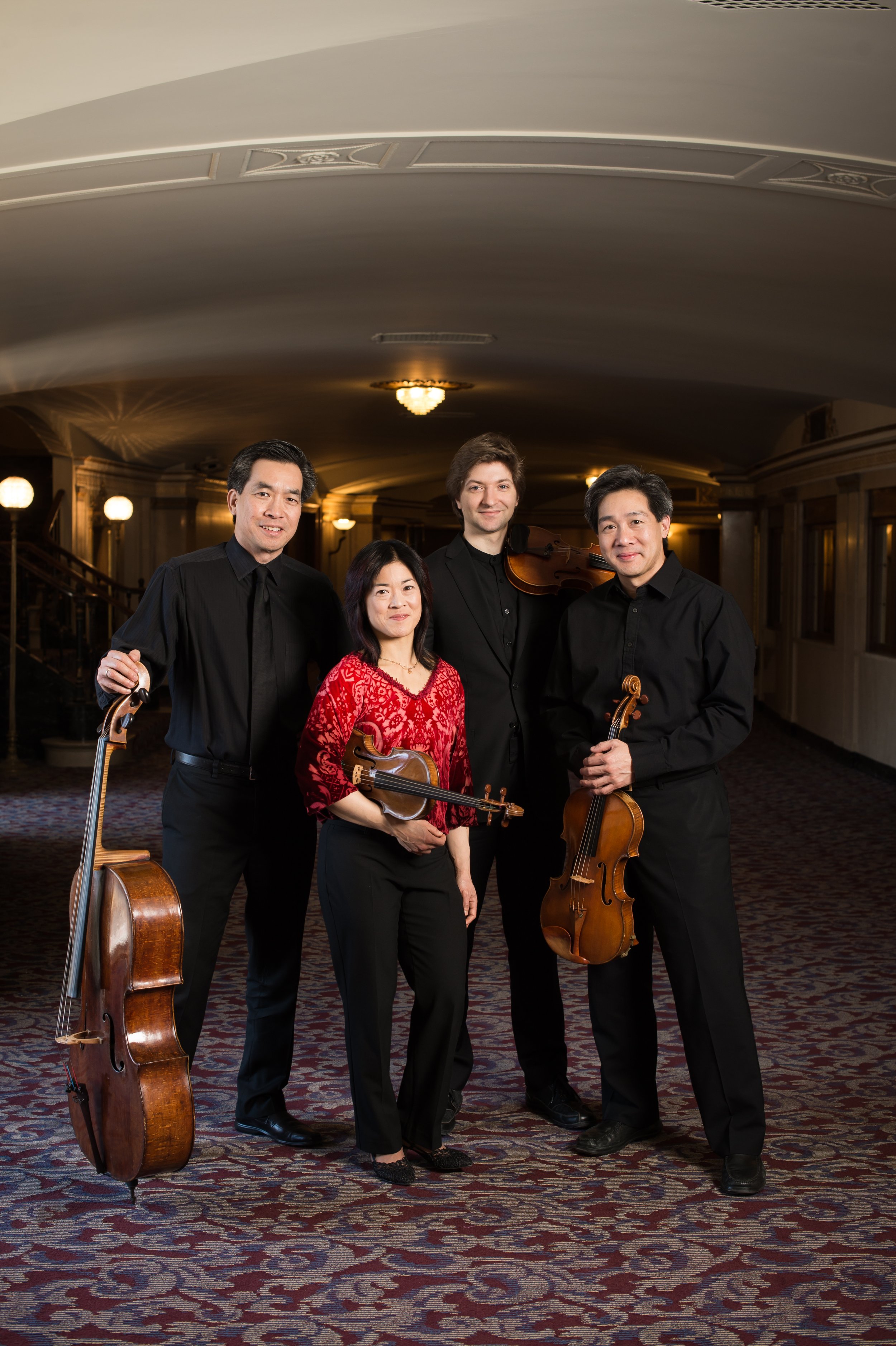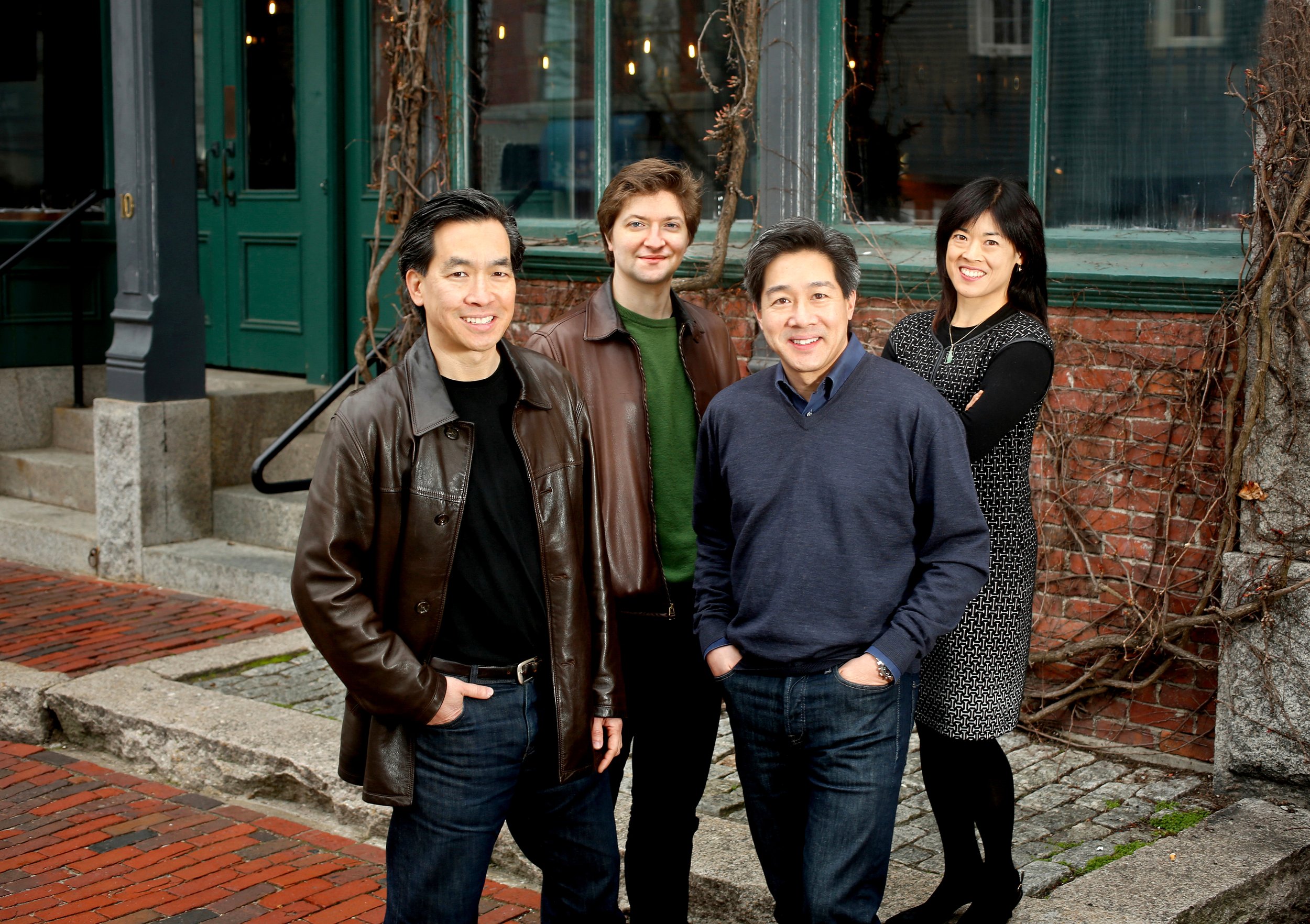
Ying Quartet
Robin Scott, violin | Janet Ying, violin | Phillip Ying, viola | David Ying, cello
“The ensemble replicated the sounds of water.”
-
The Ying Quartet first came to professional prominence as the first recipient of an NEA Rural Residence Grant which enabled them to be the resident quartet of Jesup, Iowa – a farm town of 2,000 people. The Ying went on to serve as quartet in residence at Harvard before finding its home at the Eastman School of Music where the Quartet recently celebrated its 25th anniversary.
-
Recent seasons have seen the Ying Quartet perform alongside classically-trained jazz pianist Billy Childs in his quintet written for the Yings, and a genre-defying collaborative program with PUSH Physical Theatre with the Quartet performing on stage together.
-
Recent works include Billy Childs’ Awakening; Lera Auerbach’s Sylvia’s Diary; Lowell Liebermann’s String Quartet No. 3, To the Victims of War; Sebastian Currier’s Next Atlantis; and John Novacek’s Three Rags for String Quartet.
In April 2024, bassist Xavier Foley will team up with the Ying Quartet to perform a quintet written by Xavier for the fivesome that will be performed alongside the Dvorak bass quintet. Both artists are passionate about the next generation of musicians and will include in-person engagement activities with each performance.
The Grammy Award-winning Ying Quartet occupies a position of unique prominence in the classical music world, combining brilliantly communicative performances with a fearlessly imaginative view of chamber music in today's world. Now in its third decade, the Quartet has established itself as an ensemble of the highest musical qualifications. The Quartet’s performances regularly take place in many of the world's most important concert halls; at the same time, the Ying’s belief that concert music can also be a meaningful part of everyday life has drawn the foursome to perform in settings as diverse as the workplace, schools, juvenile prisons, and the White House.
The Ying Quartet first came to professional prominence in the early 1990s as the first recipient of an NEA Rural Residence Grant which led to it serving as the resident quartet of Jesup, Iowa, a farm town of 2,000 people. Playing before audiences of six to six hundred in homes, schools, churches, and banks, the Quartet had its first opportunities to use music and creative endeavor to help build community and authentic human connection. The Quartet considers its time in Jesup the foundation of its present musical life and goals.
The Quartet’s 2023-24 season features performances for Philadelphia Chamber Music Society, Chamber Music Society of Logan, Music Toronto, and Chamber Music Albuquerque. In Spring 2024, the Ying Quartet teams up with bassist and composer Xavier Foley for a collaboration built around their shared passion for Dvořák and the progressive approach that he demonstrated through his life and music.
-
The Ying's ongoing LifeMusic commissioning project, created in response to its commitment to expanding the rich string quartet repertoire, has already achieved an impressive history. Supported by the Institute for American Music, the Ying Quartet commissions both established and emerging composers to create music that reflects contemporary American life.
Recent works include Billy Childs’ Awakening; Lera Auerbach’s Sylvia’s Diary; Lowell Liebermann’s String Quartet No. 3, To the Victims of War; Sebastian Currier’s Next Atlantis; and John Novacek’s Three Rags for String Quartet. In August 2016, the Ying Quartet released a new Schumann/ Beethoven recording on Sono Luminus with renowned cellist Zuill Bailey, and in that season the five toured with the Schumann Cello Concerto transcribed for cello and string quartet along with Beethoven’s “Kreutzer Sonata,” also reimagined for cello quintet.
The Ying Quartet's numerous other recordings reflect many of the group's wide-ranging musical interests and have generated consistent, enthusiastic acclaim. The group’s CD “American Anthem” (Sono Luminus), heralding the music of Randall Thompson, Samuel Barber, and Howard Hanson, was released in 2013 to rave reviews; its 2007 Telarc release of the three Tchaikovsky Quartets and the Souvenir de Florence (with James Dunham and Paul Katz) was nominated for a Grammy Award in the Best Chamber Music Performance category.
As longtime quartet-in-residence at the prestigious Eastman School of Music in Rochester, NY, the Ying Quartet teaches in the string department and leads a rigorous, sequentially designed chamber music program. One cornerstone of chamber music activity at Eastman is the noted “Music for All” program, in which all students curate opportunities to perform in community settings beyond the concert hall. The Quartet is also the ensemble-in-residence at the Bowdoin International Music Festival, and from 2001-2008, the members of the Ying Quartet were the Blodgett Artists-in-Residence at Harvard University.
July 2023 – Please do not edit without permission.
Videos
Programs & Repertoire
-
PROGRAM I
Franz Joseph Haydn: Quartet in B-flat major, Op. 50, No. 1
Xavier Foley: New work and other pieces
*****
Antonín Dvořák: String Quintet in G, Op. 77PROGRAM II
Antonín Dvořák: Cypresses (selections)
Carter Pann: Love Letters
Paul Moravec: Anniversary Dances
*****
Antonín Dvořák: Quartet in A-flat major, Op. 105 or Quartet in G major, Op. 106PROGRAM III
Benjamin Britten: Quartet No. 1 in D major, Op. 25
Béla Bartók: Quartet No. 6 in D minor, Sz. 114, BB 119
*****
Antonín Dvořák: Quartet in F major, Op. 96 “American”With our 2023-24 programs, we continue to celebrate the work of Antonin Dvorak, a composer whose music resonates deeply with our musical roots and our aspirations as a quartet. We began our professional career 30 years ago by moving to the rural town of Jesup, IA, on a grant from the National Endowment for the Arts. The goal of our two-year residency was to make music a part of the everyday life of the community, and our experiences there profoundly influenced our musical lives ever since. We also discovered that our life making music for and connecting to a community in rural Iowa mirrored Dvorak’s own stay in Spillville, IA, exactly 100 years before. Dvorak composed his Op 96 “American” string quartet in Spillville. We performed that quartet more than any other string quartet during those two years, relishing the irrepressible energy, optimism, warmth, sense of adventure along with a wonderful sense of ownership by the Iowa audiences of all ages.
We have gone on to explore and champion all of Dvorak’s chamber music, not only engaging with his ability to capture every human quality so powerfully, but also being inspired by his own need for and belief in community. Dvorak came to America to encourage American composers to find their own voice and also made it his musical and educational mission specifically to promote gender and racial diversity. We find in Dvorak’s example unending musical inspiration along with a mission to explore, to create, and to share our music across all of society.
These three programs are all anchored by one of Dvorak’s very best chamber works: the Op. 96 “American,” the Op. 105 and 106 quartets, and the virtuosic Op 77 quintet with string bass. The first half of each program places that music in three different contexts. Program one pairs a quartet of Haydn with the music of the wildly talented and inventive bassist, Xavier Foley, including a brand-new commission, then ends with Xavier joining the quartet for Dvorak’s bass quintet. Program two places Dvorak’s Cypresses—quartet settings of several of his love songs—alongside similar inspired music of living composers, Carter Pann and Pulitzer Prize- winning Paul Moravec. Program three emphasizes the power of the human spirit expressed in three contrasting works, but each gripping in its personal communication: Britten’s First Quartet, Bartok’s Sixth Quartet, and Dvorak’s ever-green “American” Quartet or Quintet.
-
PROGRAM I – AMERICAN HEROES
Franz Joseph Haydn: String Quartet in B-flat major, Op. 76, No. 4 “Sunrise”
Augusta Read Thomas: Eagle at Sunrise
Kevin Puts: Dark Vigil
*****
Ludwig van Beethoven: String Quartet No. 9 in C major, Op. 59, No. 3
Two decades ago, America’s character was tested by two tragic events which affected virtually every American: The Columbine school shootings, then 9/11. In the face of incalculable human cost, these tragedies also affirmed the remarkable resilience of the American spirit expressed through displays of individual heroism in ways big and small. Kevin Puts’ Dark Vigil is a direct emotional response to the Columbine shootings, and Augusta Read Thomas’s Eagle at Sunrise is a defiant response to 9/11. This program opens with Haydn’s “Sunrise” Quartet and closes with Beethoven’s Op. 59, No. 3, “Hero” Quartet, giving further context to the human instinct to endure, even against the most challenging of circumstances.
PROGRAM II – WORDS MATTERHugo Wolf: Italian Serenade
Giacomo Puccini: Chrysanthemums
Pierre Jalbert: Icefield Sonnets
*****
Franz Schubert: String Quartet in D Minor, D. 810 “Death & the Maiden”
Although we usually think of string quartets as textless, abstract expressions of human thought and emotion, this program reminds us that words matter. Pierre Jalbert’s evocative Icefield Sonnets is inspired by the poetry of Anthony Hawley and captures themes of winter in the upper Midwest. Our home base of Rochester, NY, helps us to identify with the musical depiction of frigid weather! Additional works by Wolf, Puccini and Schubert are also associated closely with text and text-setting and reflect each composer’s mastery of vocal expression even in their instrumental writing. This music inspires us toward our quartet’s goal of singing and storytelling through our instruments with as much communicative power as the human voice.
PROGRAM III – LOVE LETTERSAntonín Dvořák: Two Waltzes, Op. 54
Antonín Dvořák: Two Selections from Cypresses, B. 152
Carter Pann: Love Letters for String Quartet
*****
Antonín Dvořák: String Quartet No. 13 in G major, Op. 106
-or-
Johannes Brahms: String Sextet No. 2 in G major, Op. 36
Carter Pann wrote Love Letters to express the joys and sorrows of romantic love, just as Dvořák did with his Cypresses a century earlier. Both composers, with their rich harmonic language and melodic invention, vividly depict this most powerful of all human emotion. Even when writing music not specifically inspired by love, it’s not difficult to approach all of Dvořák’s work in this way. It is the wonderful warmth of the human spirit expressed with such range and immediacy that draws us over and over to the music of Dvořák. Dvořák’s sumptuous Op. 106 Quartet rounds out this program, or another concluding option is the Op. 36 Sextet of Brahms in which he, pining after a young woman, spells out her name, “Agathe,” in musical notes and cries out her name over and over again. -
PROGRAM I – NATURE
Joseph Haydn: Quartet TBA
Sebastian Currier: Next Atlantis
*****
Ludwig van Beethoven: String Quartet in E minor, Op. 59, No. 2PROGRAM II – ROOTS
Béla Bartók: String Quartet No. 2
Derek Bermel: Songs of Nameless Ancestors (2023)
*****
Antonín Dvořák: String Quartet in F major, Op. 96, “American”COLLABORATIVE PROGRAMS
PROGRAM III – BASS OF OPERATIONS
W.A. Mozart: String Quartet in E-flat major, K. 428
Xavier Foley: Quintet, other selections
*****
Antonín Dvořák: String Quintet, Op. 77PROGRAM IV – BILLY CHILDS
Billy Childs: String Quartet No. 2, “Awakening”
Billy Childs: The River, The Bird, and the Storm for string quartet and piano
*****
Antonín Dvořák: String Quartet in F major, Op. 96, “American”







